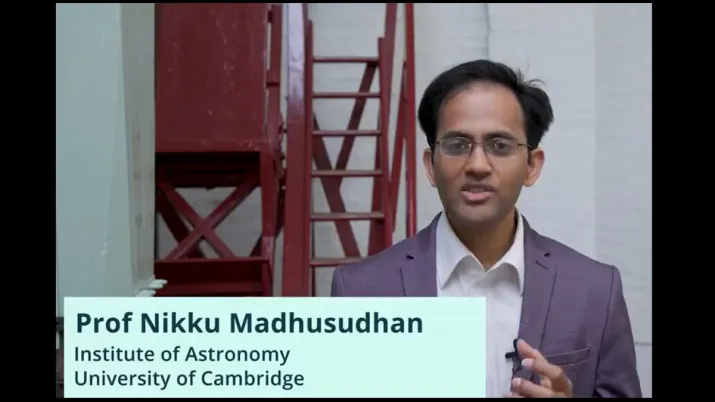With the help of cutting-edge tools like the JWST and future missions, Professor Nikku Madhusudhan’s research may soon help answer one of humanity’s oldest and most profound questions—Are we alone in the universe?
Nikku Madhusudhan, an Indian-origin Astrophysicist Professor (scientist), based in the UK, has recently gone viral for his team’s revolutionary discovery that may offer the strongest signs of life outside our solar system. His research on a distant planet named K2-18b, located 124 light-years away, has sparked global curiosity.
Who is Pprofessor Nikku Madhusudhan?
Professor Nikku Madhusudhan is a renowned astrophysicist and expert in exoplanetary science at the University of Cambridge’s Institute of Astronomy. He leads the university’s dedicated “Hycean Team,” which studies ocean-covered exoplanets.

His academic background includes:
- PhD in Physics and MS from the Massachusetts Institute of Technology (MIT)
- B.Tech degree from IIT-BHU
Over the years, he has received several prestigious accolades:
- MERAC Prize in Theoretical Astrophysics (2019) – European Astronomical Society
- Pilkington Prize for Excellence in Teaching (2019) – University of Cambridge
- Young Scientist Medal in Astrophysics (2016) – IUPAP
- Vainu Bappu Gold Medal (2014) – Astronomical Society of India
- YCAA Prize Fellowship (2011) – Yale University
What did he discover on K2-18b?
Using data from the James Webb Space Telescope (JWST), Professor Madhusudhan and his team detected chemical compounds—dimethyl sulfide (DMS) and/or dimethyl disulfide (DMDS)—in the atmosphere of the exoplanet K2-18b.
On Earth, these molecules are produced exclusively by living organisms, particularly marine phytoplankton, which makes this finding highly significant.
Although the team remains cautious, Madhusudhan emphasised the discovery as the “strongest evidence yet” of possible life beyond Earth. Further theoretical and lab studies are planned to determine whether such molecules can also arise from non-biological processes.
K2-18b: A Potential ‘Hycean’ world
K2-18b was already of scientific interest after earlier observations revealed the presence of methane and carbon dioxide—the first detection of carbon-based molecules in the atmosphere of a habitable-zone exoplanet.
Madhusudhan and his team coined the term “Hycean planet” to describe such ocean-covered worlds with hydrogen-rich atmospheres. The newly detected sulfur-based compounds align with predictions made about Hycean worlds, further supporting their theory that this planet could potentially support life.
A cautious yet hopeful outlook
Despite the excitement, Madhusudhan has not declared a confirmed discovery. Speaking to Sky News and BBC Radio 4, he mentioned that the results may still be a “statistical fluke” and that more in-depth analysis over the next year or two is needed to confirm the findings.
Nevertheless, he remains optimistic, “Given everything we know about this planet, a Hycean world with an ocean that is teeming with life is the scenario that best fits the data we have.”